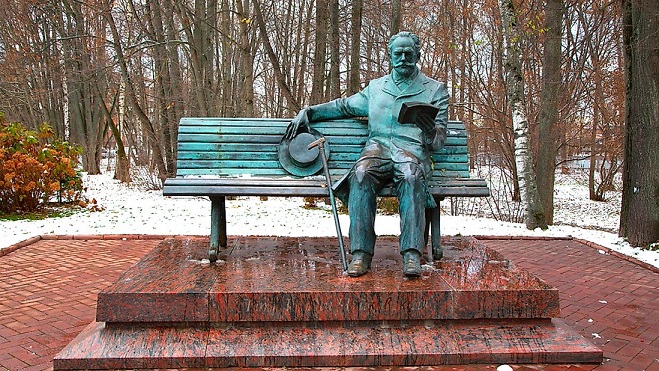.
To Tchaikovsky
by A.N. Apukhtin (1840-1893) | Translated from Russian by Olga Dumer
With my musician friend’s departure
A minor key pervades my lines.
Yet, like a fugue’s evolving texture,
Old friendship amplifies with time.
We played together, with bravura,
Our youthful daring prelude.
Since adolescence, fame’s allure
Thrilled our hearts with festive mood.
And we had faith in our flair,
We shared our feelings and beliefs…
Within the score of my young years
Yours was the leading leitmotif.
Alas! That melody once faded,
Another tune took hold of me,
My sense of harmony abated
And often I would sing off key.
My life without aim or fortune
Like tedious scales, is dull and bland.
God-given talent hasn’t flourished,
And my finale is near at hand.
But when the time comes for my burial
And I transcend to the Divine,—
Please in the chords of your memorial
Don’t mark me with a natural sign.
.
Original Russian
А. Н. Апухтин П. Чайковскому
К отъезду музыканта-друга
Мой стих минорный тон берет,
И нашей старой дружбы фуга,
Все развиваяся, растет…
Мы увертюру жизни бурной
Сыграли вместе до конца,
Грядущей славы марш бравурный
Нам рано волновал сердца;
В свои мы верили таланты,
Делились массой чувств, идей…
И был ты вроде доминанты
В аккордах юности моей.
Увы, та песня отзвучала,
Иным я звукам отдался,
Я детонировал немало
И с диссонансами сжился;
Давно без счастья и без дела
Дары небес я растерял
Мне жизнь, как гамма, надоела,
И близок, близок мой финал…
Но ты — когда для жизни вечной
Меня зароют под землей, –
Ты в нотах памяти сердечной
Не ставь бекара предо мной.
1893 г.
.
.
The Albatross
by Chales Baudelaire (1821-1867) | Translated from French by Olga Dumer
Gripped by ennui on lengthy ocean crossings,
To while away their leisure time aboard,
Bored sailors capture birds, the mighty albatrosses,
That follow ships like gallant winged escorts.
When put on deck, amidst the teasing crowd,
The king of winds, who easily would soar
Into ethereal space to haunt the stormy clouds,
Drags awkwardly his wings, like heavy futile oars.
The lord of azure skies, how timid he appears!
The speedy messenger, how clumsy is his gait!
Some jab their pipes into his beak in jeer,
Some limp like him in front of rowdy mates.
This is the Poet’s fate; his spirit flies, unbound;
In thunderous heights it effortlessly rules,
But his majestic wings impede him on the ground,
From walking in the throng of haughty, hooting fools.
.
Original French
C. Baudelaire L’Albatros
Souvent, pour s’amuser, les hommes d’équipage
Prennent des albatros, vastes oiseaux des mers,
Qui suivent, indolents compagnons de voyage,
Le navire glissant sur les gouffres amers.
À peine les ont-ils déposés sur les planches,
Que ces rois de l’azur, maladroits et honteux,
Laissent piteusement leurs grandes ailes blanches
Comme des avirons traîner à côté d’eux.
Ce voyageur ailé, comme il est gauche et veule!
Lui, naguère si beau, qu’il est comique et laid!
L’un agace son bec avec un brûle-gueule,
L’autre mime, en boitant, l’infirme qui volait!
Le Poète est semblable au prince des nuées
Qui hante la tempête et se rit de l’archer;
Exilé sur le sol au milieu des huées,
Ses ailes de géant l’empêchent de marcher.
.
.
Olga Dumer was born and educated in Moscow, Russia. Both her B.A. and M.A. degrees were in English Language and Literature and she obtained her Ph.D. in Linguistics at the Russian Academy of Sciences. Since her family moved to the USA, she has been teaching English, ESL and Linguistics in California. Her translations have been published in Four Centuries: Russian Poetry in Translation. https://perelmuterverlag.de/four%20centuries.html















Thank you, Olga, your translations are beautiful. What a great talent you have…Allegra
Thank you!
Beautiful!
Thank you!
Thank you for your translations, Olga. I really enjoyed the imagery and sentiment in each of the poems, especially the last four lines of The Albatross.
I have been curious, where does one look to find poems to translate (in my specific case, in Spanish)? Is it okay if they have been translated by others before?
Dear Anna,
I just choose poems I like. I think it’s interesting to compare different translations, but when you’re working on a poem, I never look at other versions.
Thanks Olga for choosing to translate these beautiful poems. I particularly
enjoyed the easy progression of “To Tchaikovsky”.
David, thank you for your kind words!
I especially like Apukhtin’s poem to Tchaikovsky, with so many images from music. I wonder what the poet meant by not wishing to be marked with a natural sign–but I suppose he wanted to be sharp rather than flat, as he did not like his “dull and bland” life, when his friendship with Tchaikovsky was no longer helping his talent flourish. Good choice of an intriguing poem to translate.
Dear Margaret,
Thank you for your interest! As far as I know, the natural sign in music is the one canceling the previous flats and sharps. I think the poet meant “don’t erase me from your memory”. Whatever “sharps” and “flats” we had in our relationship, remember me.
I think, the deeper is the poem, the more interpretations it evokes!
Olga, Your talent is amazing. Thank you for sharing your beautiful gift.
Dear Connie,
You are always encouraging me; I’m so grateful!
Olga, I’ve enjoyed your translations so much!
Congratulations, and thank you for the read.